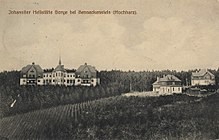Julius Boethke
Julius Boethke (born March 21, 1864 in Konitz , West Prussia province , † May 25, 1917 in Berlin ) was a German architect .
life and career
His father was the architect Emil Boethke (1828-1896), who worked as a construction clerk in the military building administration. His maternal uncle was the Berlin architect Wilhelm Böckmann . After completing his studies, he worked for the architect Ludwig Hoffmann , where he was involved in the work on the imperial court building in Leipzig . In 1890 Boethke won the Schinkel Prize for his design for a college for music. Julius Boethke then worked for the military building administration in Berlin, where he was involved in building work for larger barracks. Boethke directed the construction of the barracks for the Emperor Alexander Guard Grenadier Regiment No. 1 at the Kupfergraben . He was also involved in the renovation of the Berlin garrison church .
Boethke worked from 1899 to 1913 with the architect Heino Schmieden (1835–1913). With this he planned and built numerous buildings - in particular hospital buildings, for which Schmieden has been an expert since his office partnership with Martin Gropius . Heinrich Schmieden, Heino Schmieden's son, worked in the Schmieden & Boethke office since 1907 . Heino Schmieden has since gradually withdrawn from the office. The similarity of names between father and son Schmieden meant that their share of the work or authorship during this period could not always be clearly assigned. After his father's death, Heinrich Schmieden took over his father’s part of the office and continued to work with Julius Boethke. In 1907 the plans for a military hospital for the Imperial Navy in Flensburg-Mürwik were made together with Heinrich Schmieden. His son also worked on the design. Julius Boethke published in various specialist journals. Some of his treatises were incorporated into comprehensive textbooks. After the outbreak of World War I , as captain of the 2nd Guards Grenadier Landwehr Infantry Regiment, he led army transports through the capital for several months. Boethke died in 1917 as a result of a heart condition.
Awards
Julius Boethke was awarded the Prussian Crown Order III. Class, the Prussian Red Eagle Order IV. Class and the Knight's Cross of the Mecklenburg Order of Griffins . In 1909 he received the Royal Crown for the Red Eagle Order for working on the plans for the Flensburg-Mürwik naval hospital . After working for the Imperial Navy, he was also awarded the title of Imperial Building Councilor.
Buildings and designs
- 1898–1902: 1st construction phase of the Beelitz sanatorium in Beelitz (together with Heino Schmieden)
- 1900–1902: Johanniter-Heilstätte Sorge in Sorge in the Harz Mountains (together with Julius Boethke)
- 1900–1903: Municipal hospital in (Berlin-) Charlottenburg
- 1901–1904: Auguste Viktoria Knappschaftsheilstätte in Beringhausen near Meschede
- around 1904: Sanatorium for people suffering from cavities in Obornik (construction management by Emil Zillmann)
- around 1904: Sanatorium for lunk patients of the Prussian-Hessian Railway Association on the Moltkefels near Schreiberhau in the Giant Mountains
- around 1904: Sanatorium for people suffering from cavities of the Prussian-Hessian Railway Community in Melsungen
- around 1904: Lung sanatorium in Holsterhausen an der Ruhr
- around 1904: Johanniter Hospital in Altena
- 1906–1912: Herborn state sanatorium and nursing home (together with Heino Schmieden and probably with his son Heinrich Schmieden)
- 1907-1910: Navy hospital with head physician Villa in Flensburg - Mürwik (together with Heino Schmieden and employees of Henry forges; conservation)
The hospital was established in connection with the Naval Academy Mürwik . - 1908–1909: Casino of the officers corps of the Landwehr Inspection in (Berlin-) Charlottenburg (together with Heino Schmieden)
The building is a listed building and today serves as a museum for photography . - around 1910: Extension of the grand ducal Carolinenstift in Neustrelitz (together with Heino or Heinrich Schmieden)
- around 1910: Operating rooms in the central deaconess institution Bethanien (together with Heino or Heinrich Schmieden)
literature
- "Schm." (Heinrich Schmieden?): Julius Boethke †. In: Zentralblatt der Bauverwaltung , 37th year 1917, No. 59 (from July 21, 1917), p. 379. ( digitized version , last accessed on July 22, 2019)
- Sven-Wieland Staps: Boethke, Julius . In: General Artist Lexicon . The visual artists of all times and peoples (AKL). Volume 12, Saur, Munich a. a. 1995, ISBN 3-598-22752-3 , p. 201.
Individual evidence
- ↑ a b c d e f g h i j k l m n o p q r s t u v Julius Boethke †. In: Zentralblatt der Bauverwaltung (see literature )
- ↑ Boethke's draft for a University of Music in Berlin at the Architekturmuseum der Technische Universität Berlin , last accessed on July 22, 2019
- ↑ Plan of an outbuilding of the barracks of the Kaiser-Alexander-Gardegrenadier-Regiment in Berlin at the Architekturmuseum der Technische Universität Berlin, last accessed on July 22, 2019
- ^ Oleg Peters: Heino Schmieden. Life and work of the architect and builder 1835–1913. Lukas Verlag, Berlin 2016, ISBN 978-3-86732-169-3 , p. 116 f. ( limited preview on Google Books )
- ↑ a b c Oleg Peters: Heino Schmieden. Life and work of the architect and builder 1835–1913. Lukas Verlag, Berlin 2016, ISBN 978-3-86732-169-3 , p. 117. ( limited preview on Google Books )
- ↑ Andreas Jüttemann: The Prussian lung healing places 1863-1934 with special consideration of the regions Brandenburg, Harz and Riesengebirge. Dissertation, Berlin 2015, p. 70 f. ( Digitized version )
| personal data | |
|---|---|
| SURNAME | Boethke, Julius |
| BRIEF DESCRIPTION | German architect |
| DATE OF BIRTH | March 21, 1864 |
| PLACE OF BIRTH | Konitz , West Prussia Province |
| DATE OF DEATH | May 25, 1917 |
| Place of death | Berlin |

